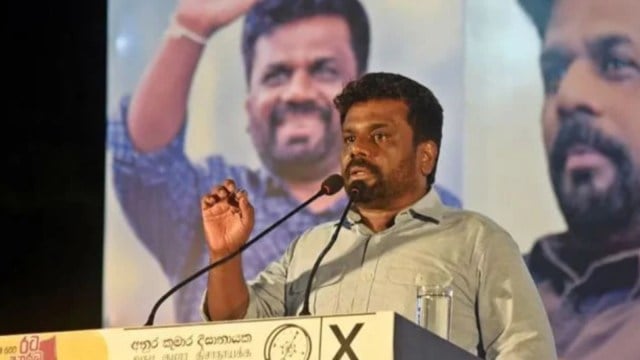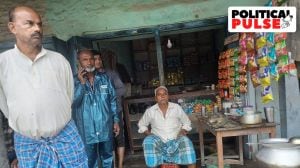Stay updated with the latest - Click here to follow us on Instagram
Marxist leader Anura Dissanayake wins Sri Lanka’s presidential election
Dissanayake, leader of the Marxist Janatha Vimukthi Peramuna party’s broader front National People’s Power (NPP), defeated closest rival Sajith Premadasa of the Samagi Jana Balawegaya after a historic second round of counting of votes.
 Known for his pro-working class stance and sharp critique of the political elite, Dissanayake captured 39.5% of the votes in the first round. (Reuters Photo)
Known for his pro-working class stance and sharp critique of the political elite, Dissanayake captured 39.5% of the votes in the first round. (Reuters Photo)Sri Lanka’s left-leaning leader, Anura Kumara Dissanayake, won the presidential election for the debt-ridden island nation on Sunday, according to the country’s Election Commission.
Dissanayake, leader of the Marxist Janatha Vimukthi Peramuna party’s broader front National People’s Power (NPP), defeated closest rival Sajith Premadasa of the Samagi Jana Balawegaya after a historic second round of counting of votes. He will take oath on Sunday, according to the NPP.
Meanwhile, incumbent president Ranil Wickremesinghe was eliminated at the end of the first round of counting.
Known for his pro-working class stance and sharp critique of the political elite, Dissanayake had clinched 39.5% of the votes in the first round. However, a second round of counting was ordered after no candidate secured over 50 per cent votes needed to be declared the winner.
After the historic second round of counting for the presidential election, Dissanayake secured 42% of the votes to be elected as the 9th president of Sri Lanka, followed by opposition leader Sajith Premadasa with 32%, according to tallies released by the Election Commission, news agency AP reported.
Popularly known as AKD, the 55-year-old leader’s win will also be a watershed moment for his Leftist party, the Janatha Vimukthi Peramuna (JVP). Once seen as a radical fringe group, the JVP lost hundreds of its armed rebels to the Sri Lankan army during the brutal uprisings of the 1980s. Securing only around three per cent of votes in the last presidential election in 2019, the NPP gained more popularity since 2022.
In the 2024 presidential race, Dissanayake’s vision of political reform resonated with voters who had grown weary of political patronage and dynastic rule. Rebranding the JVP into a broader coalition, along with the focus on women empowerment and the marginalised, are seen as key factors that earned Dissanayake widespread support.
Sri Lanka voted to elect a new president on Sept 21 in the country’s first election since the mass protests of 2022 that led to the ouster of the unpopular Rajapaksas from power. (Brothers Mahinda and Gotabaya Rajapaksa were prime minister and president respectively).
(With PTI inputs)



- 01
- 02
- 03
- 04
- 05




























